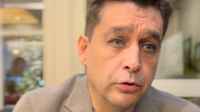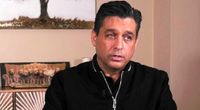On March 18, 2025, a scene unfolded on the television program 'Código 10' that has swiftly become a focal point of conversation and controversy in Spain. José Manuel Saborido, the brother-in-law of retired football star Joaquín Sánchez, appeared on the show not only to defend himself against a barrage of accusations but also to demonstrate his blindness in a shocking manner—by removing his prosthetic eyes live on air.
As he entered the studio, Saborido was visibly agitated, facing criticism regarding not only his character but also his physical condition. "I’m tired! I’m being asked whether I’m blind," he exclaimed, before dramatically removing his eye prosthetics in a bid to silence his naysayers. "Ana Belén, I am blind!" he yelled in his heated rebuttal against claims made by his ex-girlfriend, Ana Belén Faura, who had previously implied that he was faking his condition.
His appearance came against the backdrop of a series of escalating accusations, including allegations of mistreatment towards Faura, after a tumultuous relationship that lasted merely two months. Through his outburst, Saborido claimed that he has been unfairly branded a fraud and a squatter, asserting, "I have no convictions, unlike her, who has two. Ana Belén is performing a theater piece, and everything is recorded on Prosegur cameras!" His insistence on broadcasting his version of the events points to the psychological toll these accusations have taken on him.
Two weeks prior, Saborido had claimed on another show, 'De Viernes', that his sister was involved in an orchestrated attack on his home. He accused her of playing an active role in a robbery that saw him lose valuables worth up to €70,000. He alleged that his sister financed the operation. "It was a robbery!" he stated emphatically, highlighting his sense of betrayal within his family dynamics.
Despite the turmoil surrounding him, Saborido navigated his interaction with reporters with a sense of urgency, defending every aspect of his life that had come into question, including the authenticity of his blindness. The dramatic moment when he removed his eye prosthetics was not merely theatrical; it tucked into deeper insecurities and identity struggles he has faced publicly.
Social media reacted explosively to his actions. Clips of the incident quickly went viral, with Twitter flooded with memes and public commentary about the bizarre and graphic episode. Some viewers criticized Saborido’s display as unnecessary or overly dramatic, while others expressed sympathy and solidarity. The online discourse revealed how polarized public opinion can be on sensational acts of vulnerability showcased on reality TV.
Conversely, his ex-partner, Ana Belén Faura, has been notably silent following the episode. She had previously leveled accusations against him, asserting that he had no genuine disability. This silence leaves much to speculate about how these personal disputes may evolve with the continual public scrutiny of Saborido's actions.
The unfolding drama has captivated viewers not just due to its sensational nature, but also because it highlights the complex relationships within families, particularly those exposed to the pressures of public life. Joaquín Sánchez, the retired footballer and Saborido's brother-in-law, has also found himself at the center of family controversy, especially concerning alleged infidelities and controversies with social media personalities, further intertwining these familial relations with the public domain.
In light of these incidents, the broader implications for those involved are profound—creating a media spectacle that intertwines personal shame, familial betrayal, and social vulnerability. As Saborido attempts to navigate these treacherous waters, part of the public remains torn; some applaud his fortitude in plainly addressing falsehoods, while others see it as a mere spectacle for ratings.
The show highlighted not just Saborido's stark visual evidence but also his desperate attempts to reclaim agency in narratives that have largely been defined by others. His insistence on bringing evidence, like phone bills and injury reports from altercations with Faura, appears to be part of a strategic move to bolster his credibility in an atmosphere where reality television can easily blur the lines of truth.
Ultimately, the questions linger regarding the consequences of airing personal grievances on national television—how it reshapes relationships and public perception, not only for those involved but also for the audience who consume these narratives. The evolution of this drama, with Saborido at its contentious core, presents a poignant reflection on modern-day realities of public life and personal strife.






